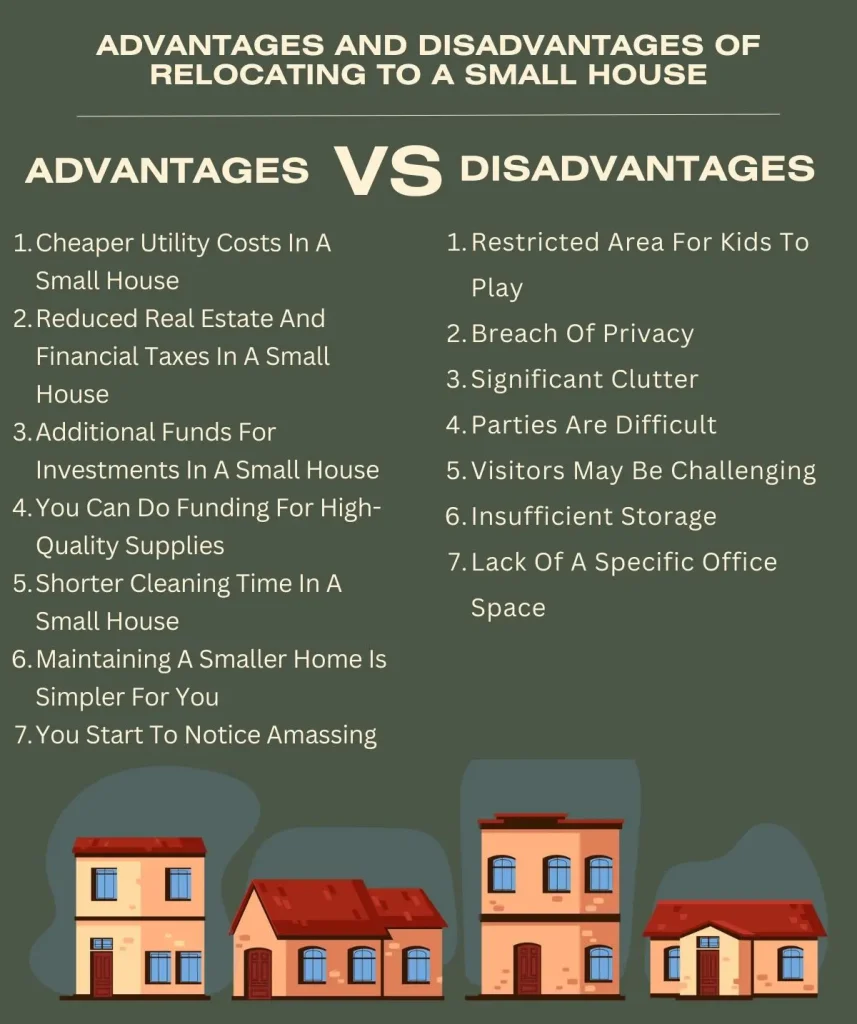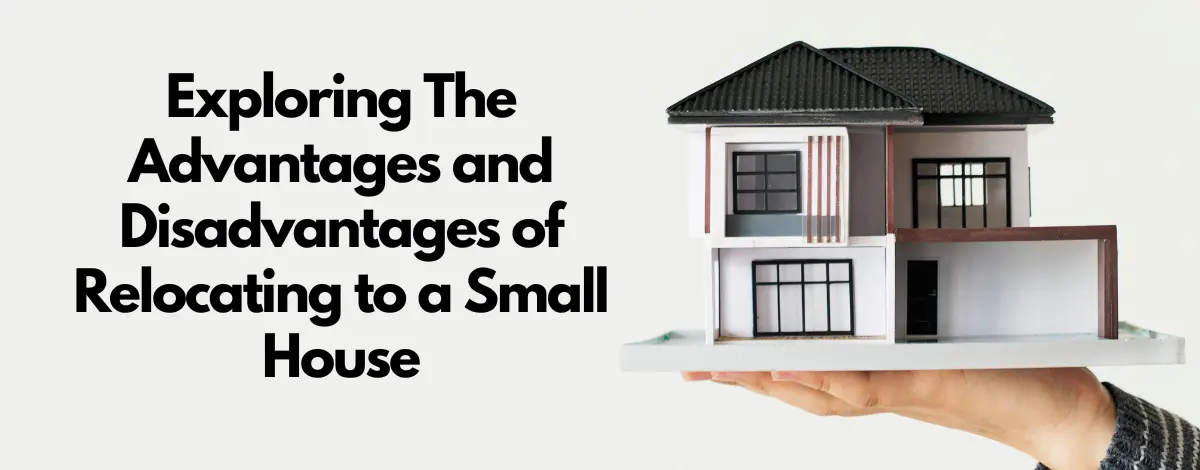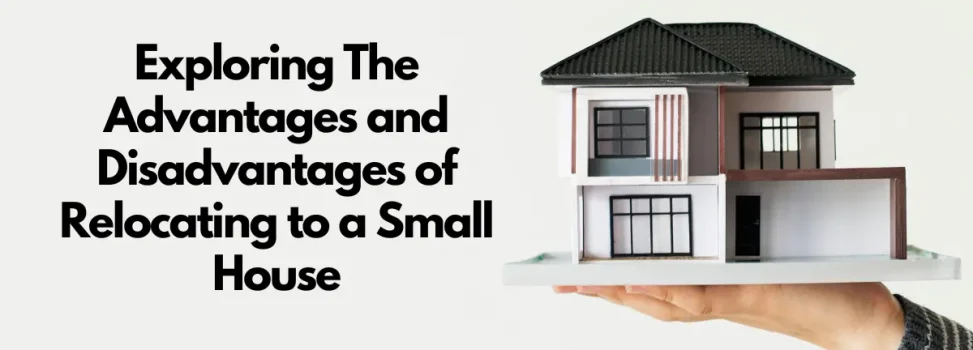Do you think that it is worthwhile to relocate to a smaller house? It might be on your mind. What happens if, after making the transfer, you come to regret your choice?
The following are certain advantages and disadvantages of relocating to a small house, which will help you make the best decision for your family.
Advantages of relocating to a small house:
Cheaper utility costs in a small house:
You will be heating, cooling, and powering more compactly in a smaller home. Your energy consumption will decrease, resulting in a reduced power cost.
Reduced real estate and financial taxes in a small house:
If you go to a smaller home within the same neighborhood, your financing and taxes will probably be lower. Remember to do your homework before relocating to determine how your new address may impact your mortgage and tax obligations.
Additional funds for investments in a small house:
Large houses usually come with many costs, whether for maintenance, bills, or other expenses. Your costs will probably be lower in a smaller home, which will free up more cash for savings and other investments.
Reduction of materials you need in a small house:
A smaller home offers you the opportunity to reduce the number of possessions you own to just those that you truly desire or require.
You can do funding for high-quality supplies:
With a smaller area to fill, you may afford to spend more on better fixtures and fittings, and other decor pieces because there won’t be as many of them available.
Shorter cleaning time in a small house:
Living in a large house might make the cleaning feel like a never-ending task. You will, yet, spend a lot less time cleaning and washing down in a smaller home.
Maintaining a smaller home is simpler for you:
Anyone who has ever owned a home is aware of how much time, work, and energy it takes to keep it maintained. When everything else is equal, it takes less duration, energy, and ability to complete that work in a smaller dwelling.
You Start to Notice Amassing:
There’s no requirement to buy an additional set of couches for the additional room because one doesn’t exist.
You’re more conscious of what you require, and it’s generally not superfluous items like additional furniture, a spare bedroom with all the amenities, or a place that appears to accumulate trash on its own.
You don’t own as many meaningless things as you once did.
Showcase items that you genuinely love and that improve your life, rather than worrying endlessly about what kind of design to put in the playroom or the visitor restroom.

The disadvantage of relocating to a small house:
Restricted area for kids to play:
If you are a parent, you are aware of how crucial it is that your children have adequate room to run off extra energy. With a small house, particularly one without outdoor space, that’s not always feasible.
Obtaining playgrounds and other recreational spaces nearby can help you make it operate, but finding a place to work off your strength at home is less handy when you don’t have much room.
Breach of privacy:
It’s easy to disregard that there are additional individuals living in a large house. In a small house, that isn’t entirely true. It’s not always simple to get privacy when you require a few moments to yourself.
Significant Clutter:
Clutter accumulates quickly and visibly in small homes, particularly if you have young kids who aren’t yet mindful of the negative effects their possessions have on the available area.
Parties are difficult:
Small homes may get full quickly, so if you’re popular for throwing parties, you may prefer to consider inviting fewer guests.
Visitors may be challenging:
A small house probably doesn’t have any spare bedrooms for overnight visitors. The sofa is frequently the only available location for visitors to sleep, which can be uncomfortable for both visitors and homeowners.
Insufficient storage
You’ll probably need to rent a warehouse if you want to keep larger goods, such as furnishings or athletic gear.
Lack of a Specific Office Space:
Finding space to utilize as a professional office could be difficult if you work from home.
You may be required to grab space from an underused nook or cupboard where you can lock off the workspace while not in use, rather than using four walls and an entryway.
There are undoubtedly methods to avoid without having a designated workspace.
Here are some ideas for creating a cozy small home:
1. Make the Most of Color:
Coloring is one of the simplest and most economical methods to drastically alter the appearance and mood of your small room, whether you own it or rent it. Milder wall colors will provide an airy atmosphere that can enlarge your room.
As a substitute, you might choose an intense hue like black to make a room seem larger. A room with black walls has depth, which can provide the impression of more space.
2. Make Wise Design Decisions:
Aside from color, other design decisions can significantly affect how you live in a small area. In general, try to find pieces of furniture that make your space appear larger. Elevated ceilings can be simulated with low-profile chairs.
Glass, acrylic, and net-like seating and racks are optically lighter, and bare racks generally appear less hefty than cabinets. Additionally, instead of covering upholstered things with exposed, slim legs, softly enlarge your room.
3. Elevate the Light:
Making the most of the natural light in a small home is one simple method to make it seem larger. Choose something airy and light, or if your residence is modest enough, think about leaving the windows bare throughout the bedrooms.
If there aren’t many windows, you can increase the impact of a window by hanging a large, ornate mirror across from it.
It can be really difficult to choose a place to reside. Location, commuting time, proximity to friends and family, the extent of the house you require for your family, and many other factors must be taken into consideration.
Living in a small dwelling might be the ideal choice for you and your family, but it’s important to understand what you’re stepping into. Before making any substantial financial commitments or rearranging your living arrangements, weigh the benefits and drawbacks of living in a small house.
FAQs about Relocating to a Small House
You do not need to use more water, electricity, gas, etc when you survive in a small house. As a result, you have all the possibilities of reducing the utility cost in a small house.
Yes, you can expect to decrease your property tax when you downsize to a smaller house.
If you use a milder wall color, it will make a small space appear larger. Try to find pieces of furniture that make your space appear larger. Making the most of the natural light in a small home is one simple method to make it seem larger.
You should consider the factors regarding the advantages and disadvantages of residing in a small house before deciding to move there.


